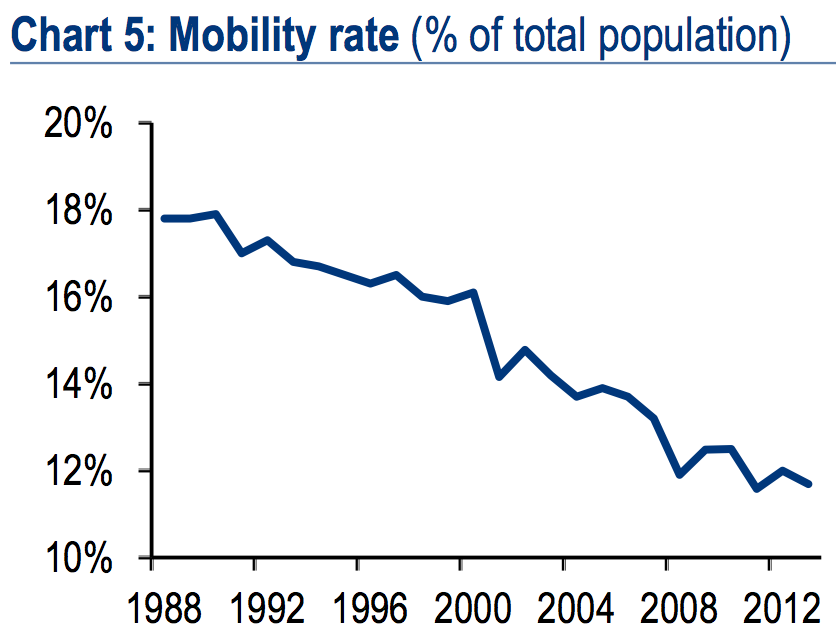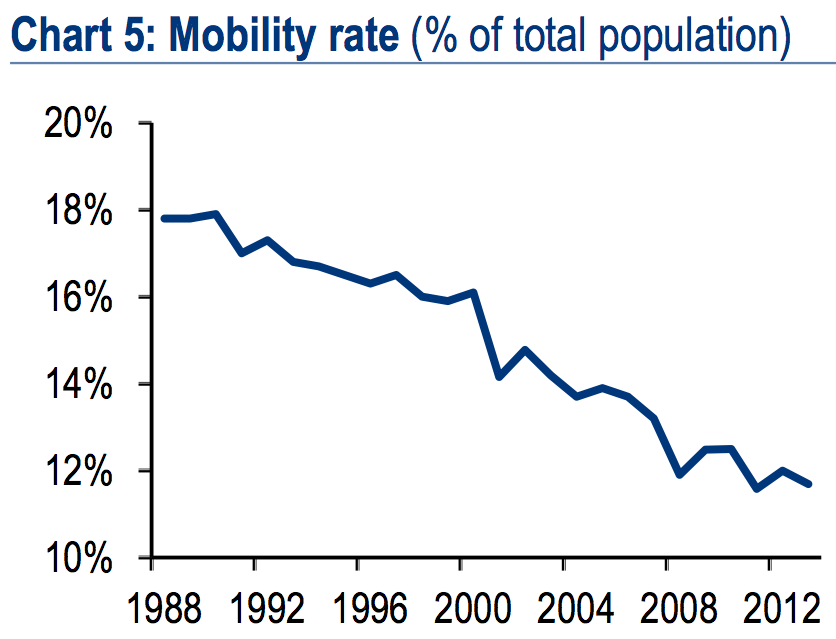Americans are moving less than they used to

A free daily email with the biggest news stories of the day – and the best features from TheWeek.com
You are now subscribed
Your newsletter sign-up was successful
This chart from Bank of America Merrill Lynch, via Business Insider's Mamta Badkar, shows that Americans are moving less than they used to:

(Bank of America Merrill Lynch)
That may be bad news for the economy. A dynamic economy requires people being able to move to wherever their most productive niche may be. Often, that can be hundreds or even thousands of miles away. So less geographic mobility tends to mean less economic dynamism. (Although in the era of telecommuting, it is possible that this is beginning to matter less.)
The Week
Escape your echo chamber. Get the facts behind the news, plus analysis from multiple perspectives.

Sign up for The Week's Free Newsletters
From our morning news briefing to a weekly Good News Newsletter, get the best of The Week delivered directly to your inbox.
From our morning news briefing to a weekly Good News Newsletter, get the best of The Week delivered directly to your inbox.
Now, the U.S. still has far more geographic mobility than, for example, Europe. That is helped by the fact that the U.S. has a single common language, unlike Europe. That's one reason why Europe's economy is struggling so much — a lack of a common language means it is much harder for people in a weaker economic area like Greece to move to a more prosperous area, like Germany.
The trend toward less mobility has been driven via the rise of homeownership in the 1990s. Homeowners are less like to move than renters because it is significantly more expensive for homeowners to move, thanks to various costs including broker fees, transaction costs, mortgage fees, insurance, and so on.
Things have gotten worse with the emergence of mortgages with negative equity — in which a borrower owes more on their mortgage than their home is worth — since the 2008 financial crisis. Now that housing prices have bottomed out (they did so in 2012) and are rising again, mobility stands a chance of beginning to rise again.
A free daily email with the biggest news stories of the day – and the best features from TheWeek.com
John Aziz is the economics and business correspondent at TheWeek.com. He is also an associate editor at Pieria.co.uk. Previously his work has appeared on Business Insider, Zero Hedge, and Noahpinion.
-
 Ex-South Korean leader gets life sentence for insurrection
Ex-South Korean leader gets life sentence for insurrectionSpeed Read South Korean President Yoon Suk Yeol was sentenced to life in prison over his declaration of martial law in 2024
-
 At least 8 dead in California’s deadliest avalanche
At least 8 dead in California’s deadliest avalancheSpeed Read The avalanche near Lake Tahoe was the deadliest in modern California history and the worst in the US since 1981
-
 Political cartoons for February 19
Political cartoons for February 19Cartoons Thursday’s political cartoons include a suspicious package, a piece of the cake, and more
-
 TikTok secures deal to remain in US
TikTok secures deal to remain in USSpeed Read ByteDance will form a US version of the popular video-sharing platform
-
 Unemployment rate ticks up amid fall job losses
Unemployment rate ticks up amid fall job lossesSpeed Read Data released by the Commerce Department indicates ‘one of the weakest American labor markets in years’
-
 US mints final penny after 232-year run
US mints final penny after 232-year runSpeed Read Production of the one-cent coin has ended
-
 Warner Bros. explores sale amid Paramount bids
Warner Bros. explores sale amid Paramount bidsSpeed Read The media giant, home to HBO and DC Studios, has received interest from multiple buying parties
-
 Gold tops $4K per ounce, signaling financial unease
Gold tops $4K per ounce, signaling financial uneaseSpeed Read Investors are worried about President Donald Trump’s trade war
-
 Electronic Arts to go private in record $55B deal
Electronic Arts to go private in record $55B dealspeed read The video game giant is behind ‘The Sims’ and ‘Madden NFL’
-
 New York court tosses Trump's $500M fraud fine
New York court tosses Trump's $500M fraud fineSpeed Read A divided appeals court threw out a hefty penalty against President Trump for fraudulently inflating his wealth
-
 Trump said to seek government stake in Intel
Trump said to seek government stake in IntelSpeed Read The president and Intel CEO Lip-Bu Tan reportedly discussed the proposal at a recent meeting